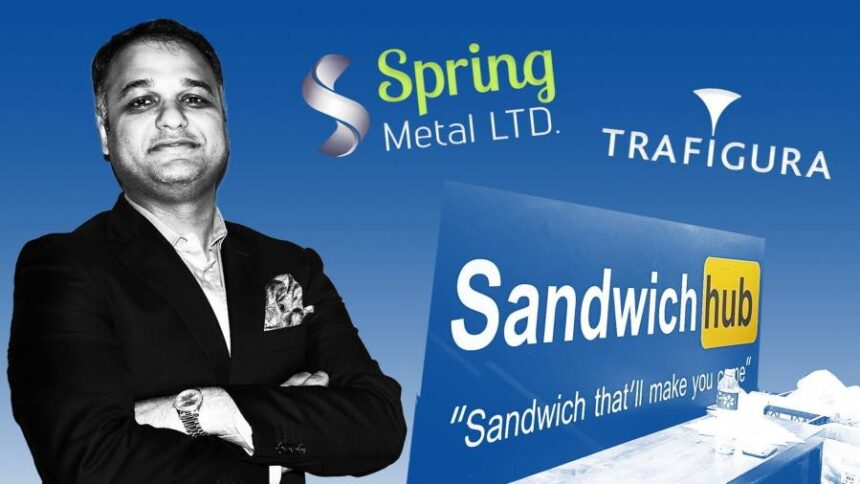Nestled in an alley near Hong Kong’s bustling Tsim Sha Tsui shopping district, Sandwich Hub sports a logo modelled on that of adult entertainment site Pornhub, along with the tagline: “Sandwich that’ll make you come”.
The hole-in-the-wall Indian food joint’s owner Aman Chourasia, a jovial 30-year-old with a baby-faced grin, is enthusiastic about its offerings, with its low-priced fare such as cheese aloo toast and masala tea.
But he is also embroiled in an alleged half-billion-dollar international fraud. Last year another business registered in his name sold cargoes of nickel to Trafigura that on inspection turned out to contain a considerably cheaper metal.
Spring Metal is one of seven companies the Singapore-based trading group has accused in London’s High Court of duping it into buying more than a thousand shipping containers of non-existent nickel. Trafigura paid the companies $535mn for the contested cargoes, equivalent to more than 7 per cent of its record $7bn net profit in 2022.
The episode has raised questions about Trafigura’s due diligence, including how it could miss multiple red flags related to its counterparties. It had few details about the owners of three of the seven companies, court filings indicate, and the trio do not appear to have lawyers to defend them in the case. Yet together they received more than half the disputed payments.
Public records reviewed by the FT and conversations with people familiar with the operations of the accused shed light on a collection of characters at the centre of a scandal that has rocked the global commodities industry.
The mastermind?
Trafigura says it uncovered the “systematic” fraud late last year when it inspected a set of containers, including some it had bought from Spring Metal, at Rotterdam’s port.
The company claims the man behind the seven companies was Dubai-based metals trader Prateek Gupta, who in 2022 was accused by New Delhi authorities of defrauding the State Bank of India. Gupta has challenged the probe.
Four of the companies it is suing have overt links to Gupta through shareholdings or directorships. Gupta, who denies wrongdoing, and the four companies have hired one of London’s highest-profile law firms, Mishcon de Reya, to act for them.
Trafigura alleges Gupta has “de facto” control of the others — Spring Metal, New Alloys Trading and Mine Craft Limited. The three companies are listed in court records as litigants in person, meaning they will represent themselves in court.
Trafigura seems to have had sparse knowledge about their current owners and claims it relied heavily on Gupta and an operations executive he employed to handle trades. Gupta, Trafigura alleges in court filings, even had access to Spring Metal’s email account.
Trafigura declined to comment citing the ongoing litigation.
A spokesman for Gupta said he and the other defendants represented by Mishcon would file a “robust defence” this week, adding that it would be “inappropriate to share its contents” before filing it at court. “It will address all the issues raised in Trafigura’s claim,” he added, including “the relationship” with Spring Metal, Mine Craft and New Alloys “to the extent that is relevant”.
In an affidavit sworn by Trafigura’s former head of nickel trading Sokratis Oikonomou in February, the company indicated that it was “continuing to investigate” the ownership structure of Hong Kong-based Mine Craft Limited.
Corporate filings reviewed by the FT show that its ultimate owner is a man whose now-deleted Facebook page identified him as a chef at Palm Jumeirah, the glitzy palm-shaped man-made archipelago in Dubai.
Buybacks
Trafigura’s relationship with Gupta dates back to 2014, according to court filings, with the company later entering trades with the seven defendant companies.
Initially, Trafigura simply bought metals from them and sold them to its customers. But by 2022 most of the trading consisted of “buyback” transactions in which it bought metal cargoes from the companies and then sold them back either to the same entities or to others they nominated.
The prices at which Trafigura bought and sold the cargoes were “calibrated so that it would earn a return equivalent to interest on the value of that nickel” while it was in transit, Trafigura said in court filings.
For the companies, that was the cost of what was in effect a short-term borrowing arrangement that brought in cash. At times the “voyage periods”, or the amount of time before the companies had to repay the money, were “intentionally maximised” so the companies could keep hold of the money paid by Trafigura for as long as possible, Oikonomou said.
Citibank financed the trades by providing a repurchase facility to Trafigura that was worth $850mn by 2020. The set-up involved the US investment bank temporarily buying the cargoes while they were in transit, before selling them back to Trafigura, Oikonomou said.
The commodity trader did not usually physically inspect the shipments, until Citi started insisting on checks in October, according to Oikonomou. Trafigura did not always insist on providing documents from the metal’s producer known as “certificates of analysis”, he added.
Citi stopped financing the trades in October. A spokeswoman for Citi said its sole client and counterparty was Trafigura.
Know your customer
The seven companies were “onboarded as trading counterparties in accordance with Trafigura’s internal KYC [know-your-customer] procedures”, according to Oikonomou’s affidavit.
When they first started doing business with Trafigura, Mine Craft and New Alloys were subsidiaries of an Emirati metals trading company. By the time of the contested transactions with Trafigura they had been split up and operated under separate ownership.
Chourasia incorporated Spring Metal in the low-tax, high-secrecy Malaysian offshore centre of Labuan in January 2015 when he was in his early twenties, according to corporate records, three years before he set up Sandwich Hub.
His vision, laid out on Spring Metal’s website, was to be a “determining influence in the metal industry locally and internationally”. In 2022 he incorporated another electronics and scrap metals trading company which describes itself as a “global trading and logistics leader”.
When the Financial Times visited his Hong Kong sandwich shop unannounced on a weekday afternoon, Chourasia was relaxing at a small table in the alley.
He joked about the shop’s branding while lamenting that some of its customers had moved to Singapore in recent years, part of a wider exodus from the city. But he would not immediately comment on the Trafigura case.
“We dispute the allegations that have been made by Trafigura and will defend the claim in full”, he said later by email, but declined to address individual allegations in detail in light of the court proceedings.
Chourasia’s father Uday, who on the website of a now-insolvent commodities company describes himself as an “avid metal trader”, was employed by Gupta at one of his Dubai-based trading companies, according to a document seen by the FT.
In a text message to the FT, Uday Chourasia denied that he works for Gupta but did not respond to a query about whether he had previously been employed by him.
Litigants in person
Mine Craft last year arranged a nickel buyback with Trafigura at an interest rate of 5.75 per cent. Its owner is a company whose sole shareholder is Upadhyay Shovakhar, a Nepalese citizen in his mid-40s, according to corporate filings reviewed by the FT.
Upadhyay’s Facebook account identified him as a chef at Palm Jumeirah, the man-made island on which Gupta has a villa that was included in a freezing order that Trafigura obtained in May.
A spokesperson for Gupta did not comment on whether Upadhyay had ever been employed by him, his wife or his companies.
A photo posted on Facebook in 2018 shows Upadhyay at a celebration alongside relatives of Chourasia and another executive who acted on behalf of Gupta’s companies in negotiations with Trafigura.
The landlord and current tenant at the Dubai address that Mine Craft’s company filings list for Upadhyay told the FT he was not known there and that neither Upadhyay nor Mine Craft had ever rented the residential flat.
Mine Craft’s corporate secretary in Hong Kong resigned in mid-February, saying its fees had not been paid. Upadhyay did not respond to multiple requests for comment. Trafigura’s filings do not indicate that it ever dealt with Upadhyay himself.
The third defendant not represented by Gupta’s lawyers is Singapore-based New Alloys Trading. Its sole shareholder is Manoj Menon, whose name is listed on an internet domain record as the registrant for udtradinggroup.com, which shares its name with one of Prateek Gupta’s businesses, UD Trading Group.
When reached by email, Menon told the FT he had not registered the domain name and underlined that the email address used on the registration record was not his, concluding that it “surely has been done by someone else” without his knowledge or approval.
Menon said the suggestion that Gupta controlled New Alloys was “unfounded” and based on “mere allegations” by Trafigura. “All I can say is that there was no fraud on Trafigura and we will bring out the facts of the transactions to the court,” he said.
New Alloys’ email communications with Trafigura were frequently handled by Kishor Sebastian, according to Trafigura’s claim. Sebastian identifies himself as New Alloys’ Singapore country head on his LinkedIn profile, which also indicates he worked at Prateek Gupta’s UD Trading from 2016 to 2019. Sebastian did not respond to requests for comment.
He appears to have been a visitor to Sandwich Hub. In 2018, a person posting under the name Kishor Sebastian posted a picture of the shop with its risqué signage on a review website.
Additional reporting by Chan Ho-him and Simeon Kerr











